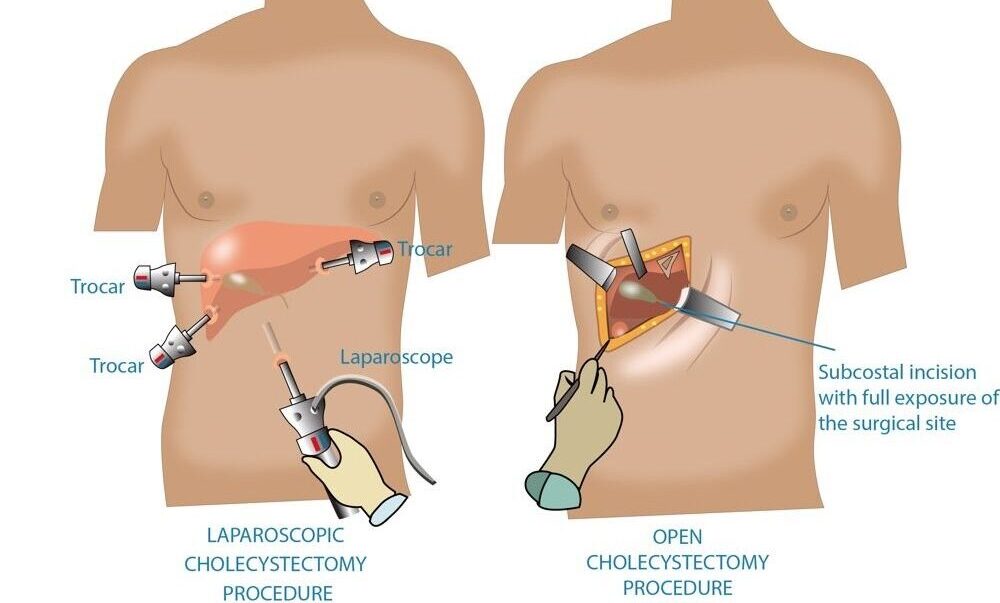Is a Cholecystectomy Major Surgery?

Cholecystectomy, the surgical removal of the gallbladder, is one of the most frequently performed surgeries around the globe. This procedure is essential for individuals suffering from gallbladder issues such as gallstones, inflammation, or infection. Despite its commonality, many people question whether cholecystectomy is considered a major surgery and what it entails.
With millions of cholecystectomies carried out worldwide each year, it is crucial to understand the nature of this surgery, its risks, and its benefits. To provide clarity, we will explore the details of cholecystectomy. This comprehensive guide will help you understand the procedure and offer a clear picture of what patients can expect.
What Exactly Is Cholecystectomy?
Cholecystectomy (Gallbladder Removal Surgery) involves the surgical removal of the gallbladder, a small organ located beneath the liver. The gallbladder’s primary function is to store bile, a digestive fluid produced by the liver. When this organ becomes inflamed or develops gallstones, it can cause significant pain and digestive problems. The surgery aims to relieve these symptoms and prevent further complications.
There are two primary types of cholecystectomy: open and laparoscopic. Laparoscopic cholecystectomy, also known as minimally invasive surgery, involves making several small incisions in the abdomen and using a camera and specialised instruments to remove the gallbladder. Open cholecystectomy requires a larger incision and is generally performed when complications arise or if the patient has specific medical conditions.
How Major Is Cholecystectomy Compared to Other Surgeries?
Cholecystectomy is considered a major surgery due to its complexity and the potential risks involved. While laparoscopic cholecystectomy is less invasive and typically has a shorter recovery time than open cholecystectomy, both procedures involve significant medical intervention. Dr. Mouhsen notes, “Although laparoscopic cholecystectomy is minimally invasive, it still requires careful planning and execution. The risks, though relatively low, are present and must be managed effectively.”
The major aspects of cholecystectomy include the potential for post-surgical complications, the use of general anaesthesia, and the recovery process. Even though the laparoscopic method minimises physical trauma, it still involves surgical risks such as bleeding, infection, and injury to surrounding organs. Open cholecystectomy carries additional risks due to the larger incision and more extended recovery period.
What Are the Risks and Complications of Cholecystectomy?
As with any major surgery, the cholecystectomy procedure carries certain risks and potential complications. Common risks include:
- Infection: This can occur at the incision site, though proper care can mitigate this risk.
- Bleeding: While rare, bleeding may occur and sometimes requires a blood transfusion.
- Bile Duct Injury: Occasionally, the bile ducts can be injured, which is a serious but manageable risk.
Dr. Mouhsen emphasises, “The risks associated with cholecystectomy are manageable. Our goal is to minimise these risks through meticulous surgical techniques and diligent post-operative care.”
What Can Patients Expect During and After the Surgery?
During a cholecystectomy, patients are under general anaesthesia, ensuring they are unconscious and pain-free throughout the procedure. The surgery usually lasts between one to two hours, depending on whether it is performed laparoscopically or openly.
After the surgery, patients may experience some discomfort, which can be managed with pain medications. Most patients recover within a few weeks following laparoscopic surgery, whereas open cholecystectomy may require a more extended recovery period.
One satisfied patient of Dr. Mouhsen shared, “I underwent laparoscopic gallbladder removal, and the recovery was faster than I anticipated. Dr. Mouhsen’s team provided outstanding care, and I was back to my usual routine in no time.”
Another patient expressed, “After enduring severe pain, I chose open cholecystectomy. Dr. Mouhsen was both reassuring and thorough, clearly explaining each step of the procedure. The surgery went well, and I felt well-supported throughout my recovery.”
What Is the Cost of Cholecystectomy Surgery?
The cost of cholecystectomy surgery in Dubai typically ranges between USD 3,000 to USD 7,000. However, the cost can vary widely depending on factors such as the type of procedure (laparoscopic or open), the healthcare facility, and the region. Generally, laparoscopic cholecystectomy is more cost-effective due to its minimally invasive nature and shorter recovery time.
For a more accurate estimate, it is advisable to consult with healthcare providers and consider any additional expenses related to pre-and post-operative care.
Conclusion
Cholecystectomy, though commonly performed, is considered a major surgery due to its complexity and the associated risks. Whether laparoscopic or open, the procedure aims to alleviate significant gallbladder-related issues and improve quality of life. With modern surgical techniques, patients can expect a thorough and supportive experience throughout their journey. Understanding the procedure, its risks, and recovery can help patients make informed decisions and prepare effectively for a successful outcome.
FAQs
1. What are the common symptoms after cholecystectomy?
Common symptoms include discomfort, nausea, and fatigue, which are managed with medication.
2. Can I eat normally after a cholecystectomy?
Most patients can return to a normal diet after recovery, though some dietary adjustments may be needed.
3. Is the Bile Duct Removed with Gallbladder Surgery?
No, the bile duct is not removed during gallbladder surgery; the procedure focuses on removing the gallbladder while preserving the bile duct.
4. What should I expect in terms of pain management after cholecystectomy?
Discomfort is common but manageable with prescribed pain medications and proper care.
5. Are there any long-term effects after having a cholecystectomy?
Most patients experience no long-term effects, though some may have dietary adjustments.
Explore more blogs: How Can You Differentiate Appendicitis from Other Abdominal Pain?

